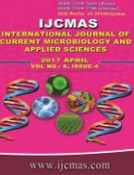


 National Academy of Agricultural Sciences (NAAS)
National Academy of Agricultural Sciences (NAAS)

|
PRINT ISSN : 2319-7692
Online ISSN : 2319-7706 Issues : 12 per year Publisher : Excellent Publishers Email : editorijcmas@gmail.com / submit@ijcmas.com Editor-in-chief: Dr.M.Prakash Index Copernicus ICV 2018: 95.39 NAAS RATING 2020: 5.38 |
Oil rich effluents are always a menance for many industries in the process of effluent treatment. The process usually requires more complex methods to resolve the issue to reach to disposable effluent standards. Enzymatic degradation was proved to be promising for the efficient treatment of oil rich effluents. Among the hydrolytic enzymes, lipases are the second most widely-used enzymes in industrial applications. A potential lipolytic fungus obtained from a marine soil sample exposed to oil spillage was identified as Aspergillus japonicus MF-1. A maximum activity of 266 U/g was observed using solid state fermentation (SSF) utilizing groundnut oil cake. Lipase activity was found to be enhanced by oxidizing and reducing agents. Medicinal oil effluent was biotransformed to produce lipase under submerged fermentation to achieve a maximum activity of 153.4 U/ml. For lipase production using A. japonicus MF-1, solid state fermentation was found to be a cost effective and better strategy. Moreover, the usage of medicinal oil like effluents for lipase production is quite promising for bio-remediation of oil rich effluents.
 |
 |
 |
 |
 |